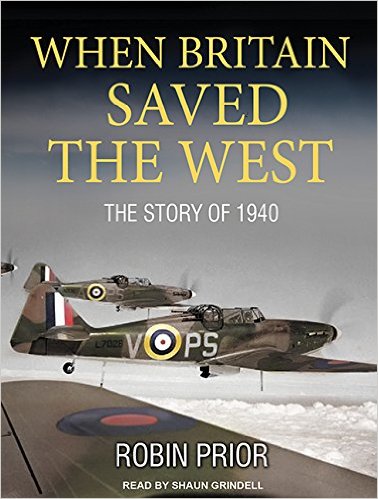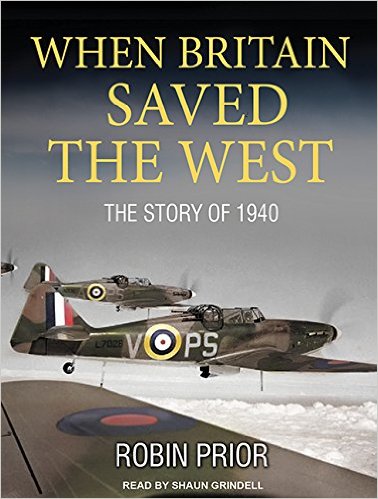
Finest Hour 172
Books, Arts, & Curiosities – The Finest Hour Revisited

June 12, 2016
Finest Hour 172, Spring 2016
Page 47
Review by Robert Courts
Robin Prior, When Britain Saved the West, Yale University Press, 2015, 360 pages, $35 / £20. ISBN 978-0300166620
 When I was young, I remember a book by Herbert Agar, Britain Alone, left lying on the stairs by my parents. I was intrigued by the picture of the Tommy on the cover staring in defiance at the clouds of aircraft swarming over the cliffs of Dover. I became dimly aware that this was something that had happened to my country, not so long ago, and that it was a “big deal.” When older, I read the book, which told in ringing tones what is still one of the most stirring stories in all history: the lonely, vital stand of Britain and the Commonwealth between the fall of France and Hitler’s invasion of Russia. This is the story that Robin Prior tells here, and it is told in equally memorable style.
When I was young, I remember a book by Herbert Agar, Britain Alone, left lying on the stairs by my parents. I was intrigued by the picture of the Tommy on the cover staring in defiance at the clouds of aircraft swarming over the cliffs of Dover. I became dimly aware that this was something that had happened to my country, not so long ago, and that it was a “big deal.” When older, I read the book, which told in ringing tones what is still one of the most stirring stories in all history: the lonely, vital stand of Britain and the Commonwealth between the fall of France and Hitler’s invasion of Russia. This is the story that Robin Prior tells here, and it is told in equally memorable style.

2024 International Churchill Conference
This is an accurate, straightforward, narrative history of a compelling story. It is predominantly a military history, describing the Battle of France, the evacuation of Dunkirk, and of Fighter Command’s immortal stand. We have the detail of squadron tactics and aircraft capabilities. Consequently, there is no mention of Churchill for large sections of the book, as is right given that he is not the primary focus. He is, however, given his rightful place.
We see the political machinations surrounding the decision to fight on, and it is in the conclusion that Churchill comes to the fore. Lord Halifax was an honourable man who sought to save Britain from what he saw as inevitable defeat. But his approach to 1940 was akin to that of a lawyer settling a ropey case, not of someone holding the fate of the free world in his hands. For all his huge intelligence and experience, he simply did not have Churchill’s understanding of the military realities or of what a peace with Hitler in 1940 would have meant. Churchill is therefore the hero in the conclusion of the book: how could he not be? For without him, Britain could do nothing.
I read this book just after visiting Oradour-sur-Glane, the French village wiped out by the SS soon after D-Day, which brings home as nowhere else just what was at stake and why it was so important that Britain did fight on. The reality is that Britain did not win the Second World War: she was too ill-prepared and Germany too strong. It took the combined industrial might of the United States and the sacrifice of the Soviet Union to bring the Nazis down. But in 1940, Britain, led by Winston Churchill, refused to lose, and that stubborn refusal kept hope alive. It is refreshing to see someone speak openly of what is now an unfashionable concept: that of the West, and of Britain saving it. Perhaps it is significant that Agar was American, and Prior is Australian; maybe it takes an Anglophone friend to remind Britain of what she achieved in those stern, great days. But the story remains as stunning now as it did in the 1980s, and Prior’s book is a great place to start. Perhaps it will inspire those who will be reviewing in the pages of Finest Hour in the 2040s.
Robert Courts is a barrister living within sight of Churchill’s grave at Bladon.
Subscribe
WANT MORE?
Get the Churchill Bulletin delivered to your inbox once a month.


